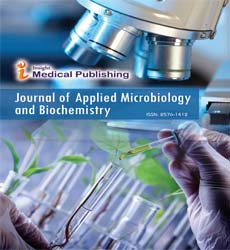ISSN : ISSN: 2576-1412
Journal of Applied Microbiology and Biochemistry
Genomic Insights into Microbial Worlds: The Impact of Metagenomics
Renshaw Caldwell*
Department of Microbiology, University of Microbial Sciences, New Haven, USA
- *Corresponding Author:
- Renshaw Caldwell
Department of Microbiology, University of Microbial Sciences, New Haven,
USA,
E-mail: rcaldwell19@yahoo.com
Received date: September 18, 2024, Manuscript No. IPJAMB-24-19812; Editor assigned date: September 20, 2024, PreQC No. IPJAMB-24-19812 (PQ); Reviewed date: October 04, 2024, QC No. IPJAMB-24-19812; Revised date: October 11, 2024, Manuscript No. IPJAMB-24-19812 (R); Published date: October 18, 2024, DOI: 10.36648/2576-1412.8.5.242
Citation: Caldwell R (2024) Genomic Insights into Microbial Worlds: The Impact of Metagenomics. J Appl Microbiol Biochem Vol. 8 No.5:242.
Description
Metagenomics, the genomic analysis of microbial communities directly from environmental samples, has transformed our comprehension of microbial diversity and functionality. By overcoming the limitations of traditional culturing methods, metagenomics allows for the exploration of the vast array of microorganisms that inhabit various ecosystems. This article reviews recent advancements in metagenomics techniques, highlights significant findings in microbial diversity and discusses their implications for biotechnology, environmental management and human health. Microorganisms are ubiquitous, playing essential roles in ecosystems, human health and industrial processes. However, traditional microbiological methods often fail to capture the full extent of microbial diversity, as over 99% of microbial species remain uncultured in laboratory settings. Metagenomics addresses this limitation by enabling researchers to study the complete genomic content of microbial communities directly from their natural environments. This article describes the methodologies, findings and applications of metagenomics, emphasizing its role in advancing our understanding of microbial ecosystems.
Advances in microbial diversity
The primary advantage of metagenomics lies in its ability to reveal the vast diversity of microorganisms that inhabit various environments. Traditional methods often underestimate microbial diversity due to the cultural bias, which limits our understanding to only a small fraction of the microbial world. Metagenomics leverages high-throughput sequencing technologies, such as Illumina and Oxford Nano pore, to generate comprehensive genetic profiles of microbial communities from samples collected in natural settings. For instance, meta- genomics analyses of the human gut microbiome have unveiled thousands of previously uncultured species, demonstrating a complex interplay of microbial taxa that significantly influences human health. These microbial communities possess a remarkable functional potential, contributing to critical processes such as nutrient cycling, pathogen resistance and environmental remediation. By analyzing metagenomics data, researchers can identify genes associated with specific metabolic pathways, offering insights into the ecological roles of various microorganisms. For example, studies have shown that specific bacterial taxa are essential for the degradation of complex pollutants in contaminated environments. The ability to characterize the functional gene repertoire of microbial communities enables the identification of key players in biogeochemical cycles, providing vital information for ecosystem management and conservation efforts. Moreover, metagenomics plays a pivotal role in understanding the human microbiome's influence on health and disease. Dysbiosis, an imbalance in microbial composition, has been linked to various health conditions, including obesity, diabetes and inflammatory bowel diseases. Metagenomics profiling can reveal microbial signatures associated with these conditions, prepare for personalized medicine approaches that target specific microbial populations to restore health. Additionally, the potential of metagenomics in drug discovery is significant, as it allows for the identification of novel bioactive compounds produced by uncultured microorganisms.
Biotechnology through microbial insights
The applications of metagenomics extend beyond ecological studies to significant implications in human health and biotechnology. In clinical microbiology, metagenomics approaches enable rapid pathogen identification in cases of infectious diseases, particularly when traditional culture methods fail. By sequencing DNA directly from clinical samples, researchers can detect and characterize a wide range of pathogens, including bacteria, viruses and fungi. This capability not only enhances diagnostic accuracy but also informs appropriate treatment strategies, thereby improving patient outcomes. Moreover, the identification of microbial communities associated with specific diseases can lead to the development of innovative therapeutic approaches. For example, Fecal Microbiota Transplantation (FMT) is a potential treatment for recurrent Clostridioides difficile infection and metagenomics analyses can help identify the optimal donor microbiome for successful FMT procedures. Additionally, metagenomics profiling can assist in understanding the intricate relationships between diet, microbiome composition and health outcomes, prepare for personalized nutrition strategies. In biochemistry, metagenomics facilitates the discovery of novel enzymes and bioactive compounds with potential industrial applications. By characterizing microbial communities in extreme environments, such as hot springs and deep-sea vents, researchers can identify extremophiles that produce enzymes capable of withstanding harsh conditions. The ability to harness the genetic potential of uncultured microorganisms through metagenomics opens new method for innovation and sustainable practices. As researchers continue to analyze microbial diversity and functionality, the implications for health, industry and environmental management will expand, highlighting the critical role of metagenomics in shaping our understanding of life on Earth.
Open Access Journals
- Aquaculture & Veterinary Science
- Chemistry & Chemical Sciences
- Clinical Sciences
- Engineering
- General Science
- Genetics & Molecular Biology
- Health Care & Nursing
- Immunology & Microbiology
- Materials Science
- Mathematics & Physics
- Medical Sciences
- Neurology & Psychiatry
- Oncology & Cancer Science
- Pharmaceutical Sciences
